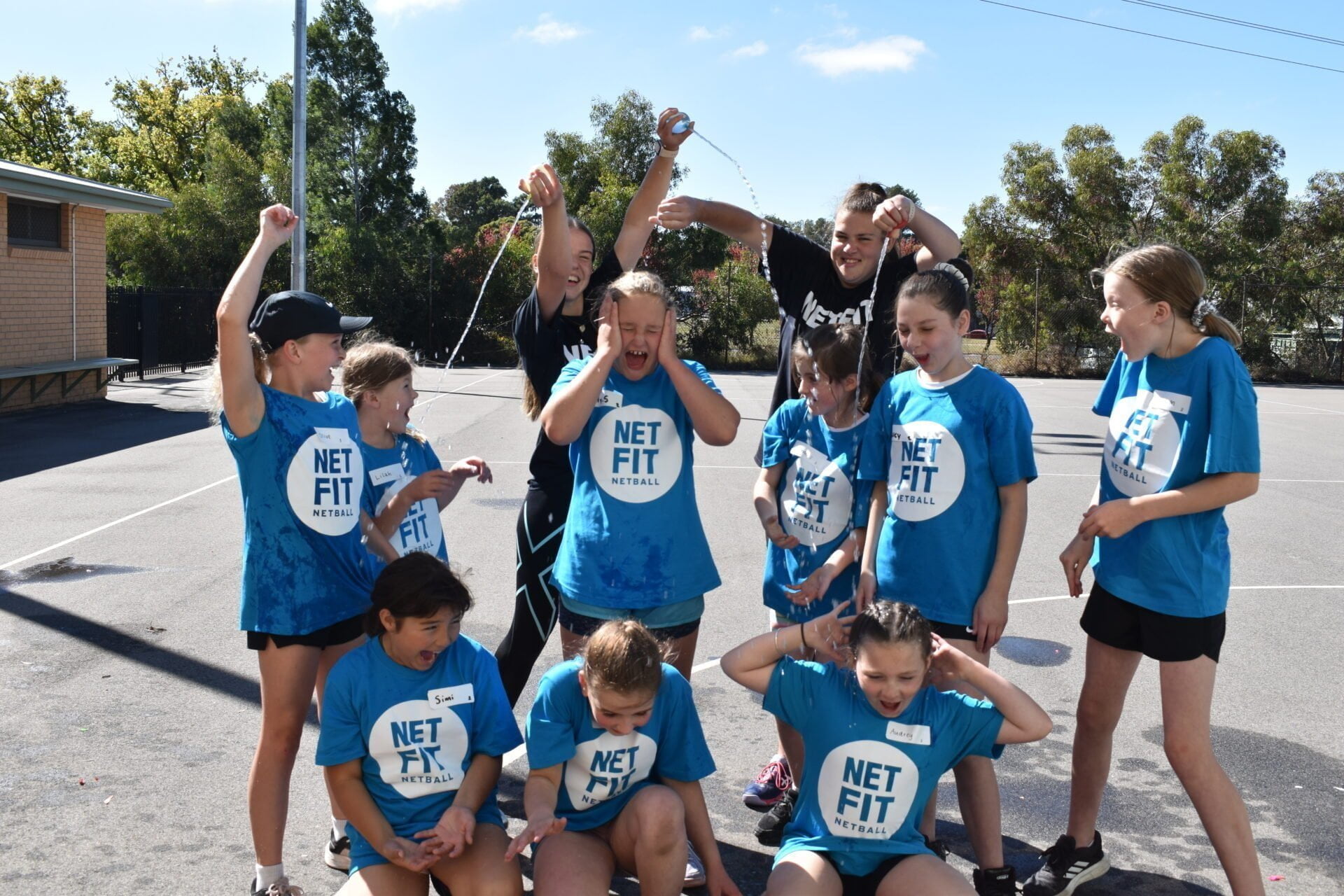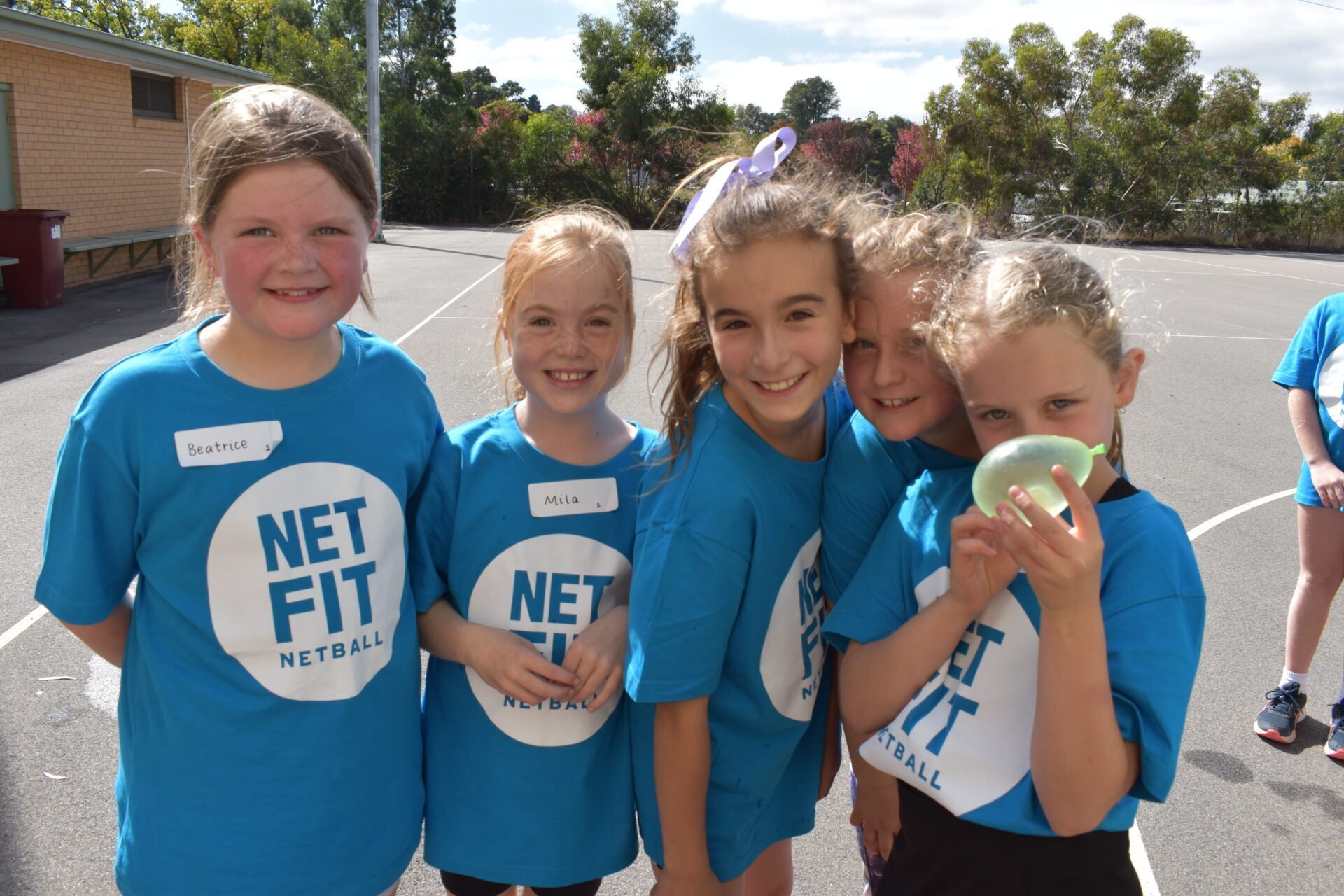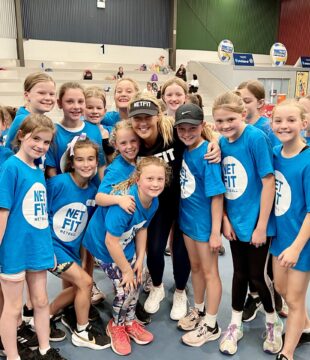More than netball – NETFIT Clinics
When our team first started running School Holiday Programs, we wanted to create a “day in the life of an elite Netballer”, but really we wanted to emotionally connect with kids and take them into an environment of inspiration where they could dream and become curious about new opportunities for girls to thrive.

I am very passionate about the 6-hour program that runs like school-time, 9am to 3pm, giving us a whole day to explore fundamental skills, nutrition experience, confidence building games, sport tech and of course developing their netball game, all while enjoying the thrills of team work in a team sport.
I know for a fact that I drive our team mad with how intense I get around programming. Our car boots are choc-a-block full of equipment, hi-tech gear and who is filling up water balloons and ice baths. The only reason I add this layer of effort is so the kids walk away from a day with us are feeling challenged, loved and hungry to engage with our sport.
I wanted to write an article to share with our NETFIT families about what goes on within the 4 walls after you drop off your darlings and our teams purposeful work behind the scenes finally kicks into action.
Here are my 3 main focuses in our new world of our ‘Bunker Babies’:
1. Coach energy and biopsychosocial awareness of our coaches.
Individual coaching briefs, expectation documents and clinic reviews are the new normal for our coaching crew.
When I write the content for our clinic days, I base all of our sessions on the biopsychosocial development of our kids.
Bio = a player’s biology
Psycho = a player’s psychology
Social = a player’s social environment
Our respective Heads of Community (VIC, NSW, QLD and New Zealand) express to our coaches that they control the energy of the day, setting an intention at the start of the day and deliberately sticking to it! I wrote an article about ‘How To Manage Your Energy” and it’s a brilliant read for anyone in a role where they work with people. It’s hard to be “on” all the time, so we need to first have awareness of when we have rest breaks and fuel our body so that when we show up, we can be the queen of the kids.
Our coaches must be in control of their enthusiasm, interest, passion, attitude, attention, and tone of how we deliver instructions. Kids have an amazing ability to read our energy, so let’s create a positive environment for them to thrive off it.
Our basic biopsychosocial practices provide the oxygen young players need for a lifetime of love of their sport and participation in netball. We are able to get a little deeper and a little broader with NETFIITERS who come back to our clinics, as we get to know them and their little personalities and how far we can extend them.

2. Awaken kids’ enthusiasm to learn and move more through music, visuals, touch and taste.
Children are visually wired – 50% of their brain is involved in visual processing, 70% of all their sensory receptors are in their eyes and they get the sense of a drill or activity in 1/10th of a second. But it is not a secret that children suffer from information overload – they receive 5 times more information than kids in the 1960s when their grandparents played with their friends.
And a crazy fact is that kids between 5-12 consume 34GB of information outside school every day. Having in mind that kids read only 28% of the words they consume, or take in 28% of your coaching direction they hear.
Again, statistics come to prove this point: colour visuals and sensory engagement increase willingness to learn by 80%, and comprehension is increased by 95% when using learning material that attracts their senses.
So why do you think, at the end of a clinic day when I ask,
“What was your favourite bit of the day?”
the kids say “Water balloon passing, Making smoothies, or NEON NETFIT glow in the dark.”
Amongst the other benefits of using sensory engagement for kids are reducing anxiety, resistance to change, and social isolation, helping children with challenging behaviour, motivation, and understanding, and serving as a tool to assist with transitions.
That’s why at this clinic, kids will experience a new survivor course which has a team-building green slime challenge all for the above reason.

3. Focus on the basic skills post-Covid
Many children starting netball are now at 7 years old, which are commonly referred to as “bunker babies” where from the age of 4-6 they had two years without basic skill development. Regardless of family protocols, children have been deprived of normal social interactions and the consistency of play base team learning. After nearly two years, the under-sevens remain in limbo…until now.
So for many parents who are feeling anxious about their kids missing out on normal life experiences, languishing in front of screens, growing up in a socially distanced world, do not fear. It is important to understand that growth maturation and development occur simultaneously and interact with each other. However, they may not follow the same timeline. Maturity-associated variation in size muscularity and physical competence begins to manifest in the years preceding adolescence about at 9-10 years old in girls and at 11-12 years old in boys.
Our clinic age range is perfect for kick-starting basic ball handling, footwork and fundamental motor skills that some kids have missed out on. We are going to focus on correct technique and repetition.
We look forward to welcoming your children’s hearts and minds into our program this July. They are only kids for such a short time, so at NETFIT our coaches will transform into megaphones for fun and engagement to ensure that they are giving your kid their very best day, fuelled by fun.
Whether they become an Australian Diamonds or not, we’ll love them for being themselves and having fun with their friends, because this is a game that you can enjoy at all ages and abilities.
By NETFIT Sarah
